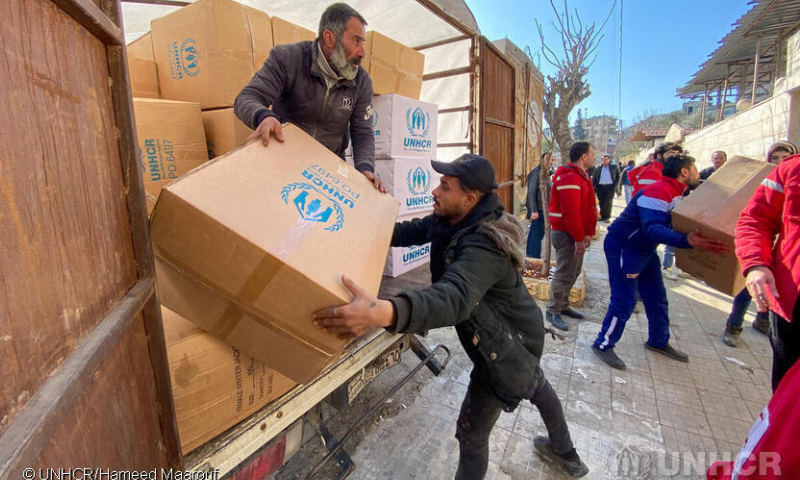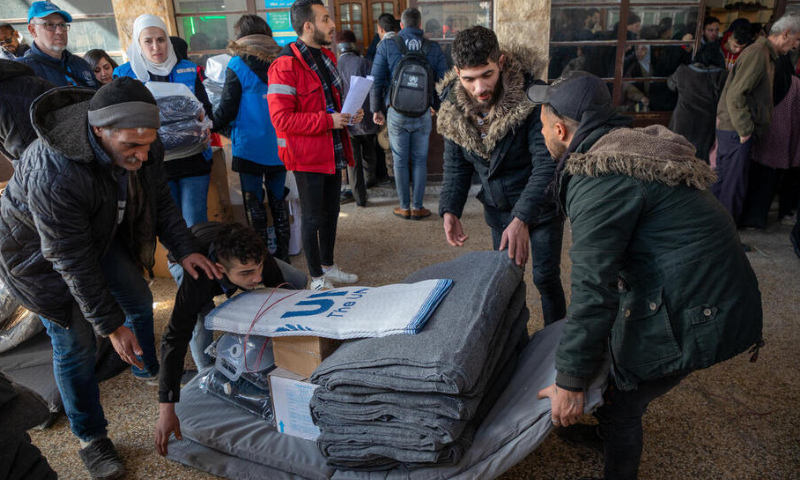
UNHRC provides assistance to families affected by the earthquake. Relief supplies include insulation blankets. Photo: Courtesy of UNHCR
The earthquake has struck a region already facing one of the most complex humanitarian challenges in the world, and it will worsen the humanitarian crisis and the suffering for Syrians, Matthew Saltmarsh, spokesperson for the UN Refugee Agency (UNHCR), told the Global Times in an interview on Friday.
With severe winter storms currently sweeping through the region compounding the vulnerability of survivors, families urgently need life-saving shelter and assistance, according to the UN official. The series of earthquakes and aftershocks that rocked Turkey and Syria on February 6 have killed more than 21,000 people, with high numbers of displaced people already present in both northwestern Syria and southeastern Turkey.
The first batch of medical supplies delivered by the Red Cross Society of China to quake-hit Syria arrived in Damascus, the capital of the country, on the evening of February 9. Red Cross relief workers also arrived along with the supplies. Media reports said that the supplies were prepared overnight and are expected to reach at least 5,000 earthquake victims in northern Syria.
Saltmarsh said he recognized China's efforts and participation in supporting Turkey and Syria, saying it is very important that all the countries that have the means offer support, both with the search and rescue side, but also with the humanitarian side.
China sent quick assistance to earthquake-struck Turkey and Syria with its rescue teams, consisting of hundreds of members and a cutting-edge earthquake rescue system on February 8 to race against time to save lives. More batches of supplies will arrive soon.
The extremely challenging situation is happening in the northwest of Syria, where the earthquake and a severe snowstorm have damaged or blocked many roads, causing power outages and disruptions to the telecommunications networks and hampering relief efforts, according to Saltmarsh.
One of the main roads used to truck aid to northwestern Syria was damaged in the earthquake on the Turkish side, making it difficult to bring in new supplies. This new emergency is compounding suffering in a country already devastated by 12 years of conflict and crisis. The region also continues to witness extremely cold temperatures, complicating response efforts, Saltmarsh said.
Among those affected in Syria are families that were already displaced from their homes by the country's long-running crisis, living in tents, flimsy shelters and partially destroyed buildings.
The US sanctions have made many Syrians suffer especially after the massive earthquake. The Syrian Red Crescent chief on February 7 called for the lifting of US and Western sanctions on Syria to facilitate relief efforts as the earthquake-stricken country is in dire need of rescue equipment.
Saltmarsh told the Global Times that they echo the sentiments of UN Secretary General Antonio Guterres, who said no sanctions of any kind should interfere with relief to the population of Syria in the present moment.

UNHRC provides assistance to families affected by the earthquake. Relief supplies include insulation blankets. Photo: Courtesy of UNHCR
The spokesperson said that for the displaced, the pressing needs are basic: shelter, food and water, warmth, security and medicine. Inside Syria, the most immediate need is to reach people who are in dire need of assistance; 10.9 million people have been affected by the earthquake in the northwestern governorates of Aleppo, Hama, Idlib, Latakia and Tartus. The immediate needs identified include food, shelter, non-food items and medicines.
The UNHCR is now providing lifesaving emergency supplies, including tents, mattresses, kitchen sets and clothes for distribution to those whose lives have been affected, and that includes refugees and the local host population in both Syria and Turkey.
The 10 Turkish provinces that have been impacted by the earthquake are those hosting the largest refugee population in the world. More than 1.7 million of the 15 million people inhabiting these 10 provinces are Syrian refugees, and in some of these provinces - Kilis for example - one out of every two people is a refugee. In Gaziantep, Şanlıurfa and Hatay, one out of four or five are also refugees, the spokesperson said.
"We do not know the exact number of refugees impacted and we might not for some days, but we fear the number might be significant given the epicenter of the quake was close to areas with high concentrations of refugees," he noted.
Saltmarsh said that his organization is now raising urgently needed funds that it can then channel into the relief efforts to support those people who have been left devastated on the ground.
"We hope that people in China will be generous and will donate to UNHCR and other organizations, but also that governments and individuals around the world will be ready to step up and to help those people who are so desperately in need," he said.





